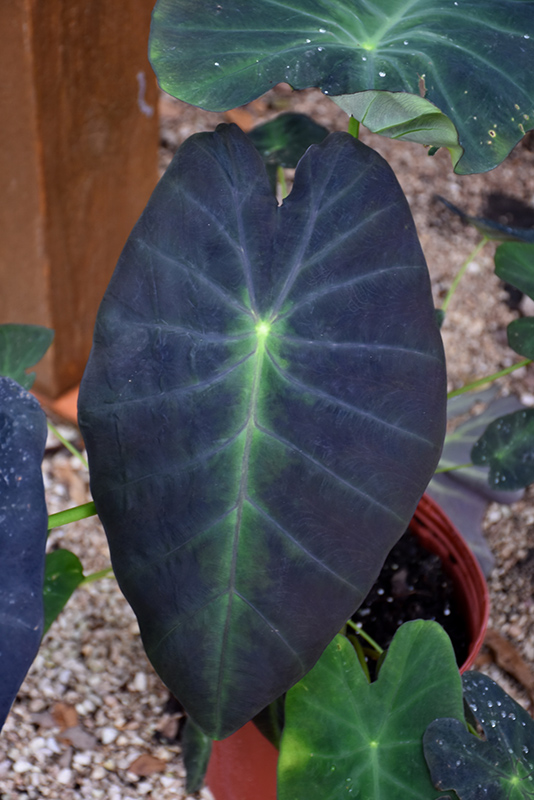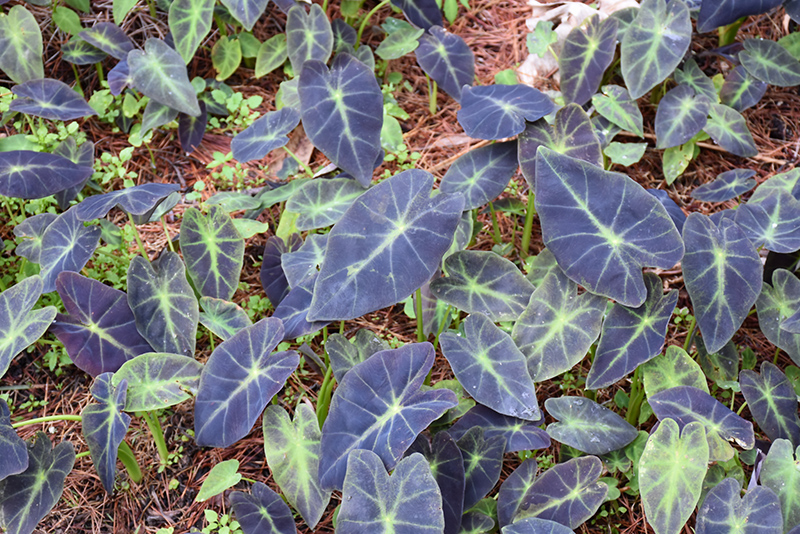Black Beauty Elephant Ear
Colocasia esculenta 'Black Beauty'
Height: 5 feet
Spread: 4 feet
Sunlight:
![]()
![]()
Hardiness Zone: 8b
Other Names: Cocoyam, Dasheen, Taro
Description:
Huge, stunning, black to deep purple leaves with contrasting apple-green veins and stems; a tremendous garden or pondside accent; in colder climates it can be removed after first frost and stored in a cool dry place until spring
Ornamental Features
Black Beauty Elephant Ear is primarily valued in the landscape or garden for its cascading habit of growth. Its attractive enormous heart-shaped leaves emerge light green in spring, turning black in color with distinctive light green veins and tinges of deep purple throughout the season. The light green stems can be quite attractive.
Landscape Attributes
Black Beauty Elephant Ear is an open herbaceous perennial with a shapely form and gracefully arching foliage. Its wonderfully bold, coarse texture can be very effective in a balanced garden composition.
This is a relatively low maintenance plant, and should be cut back in late fall in preparation for winter. It has no significant negative characteristics.
Black Beauty Elephant Ear is recommended for the following landscape applications;
- Accent
- Mass Planting
- General Garden Use
- Container Planting
Planting & Growing
Black Beauty Elephant Ear will grow to be about 5 feet tall at maturity, with a spread of 4 feet. It grows at a fast rate, and under ideal conditions can be expected to live for approximately 10 years. As an herbaceous perennial, this plant will usually die back to the crown each winter, and will regrow from the base each spring. Be careful not to disturb the crown in late winter when it may not be readily seen!
This plant does best in full sun to partial shade. It is quite adaptable, prefering to grow in average to wet conditions, and will even tolerate some standing water. It may require supplemental watering during periods of drought or extended heat. It is not particular as to soil pH, but grows best in rich soils. It is somewhat tolerant of urban pollution. Consider applying a thick mulch around the root zone over the growing season to conserve soil moisture. This is a selected variety of a species not originally from North America. It can be propagated by division; however, as a cultivated variety, be aware that it may be subject to certain restrictions or prohibitions on propagation.
Black Beauty Elephant Ear is a fine choice for the garden, but it is also a good selection for planting in outdoor pots and containers. Because of its height, it is often used as a 'thriller' in the 'spiller-thriller-filler' container combination; plant it near the center of the pot, surrounded by smaller plants and those that spill over the edges. It is even sizeable enough that it can be grown alone in a suitable container. Note that when growing plants in outdoor containers and baskets, they may require more frequent waterings than they would in the yard or garden.
Disclaimer - This Plant Finder tool is an online resource representing many of the varieties that we carry over the course of the season, and is intended for informational purposes only. Inventory varies seasonally, so we cannot guarantee that every plant will be in stock at all times - please contact the store directly for current availability. It does not include our entire selection of plants, so be sure to visit our store to see varieties that may not be represented on this list.


